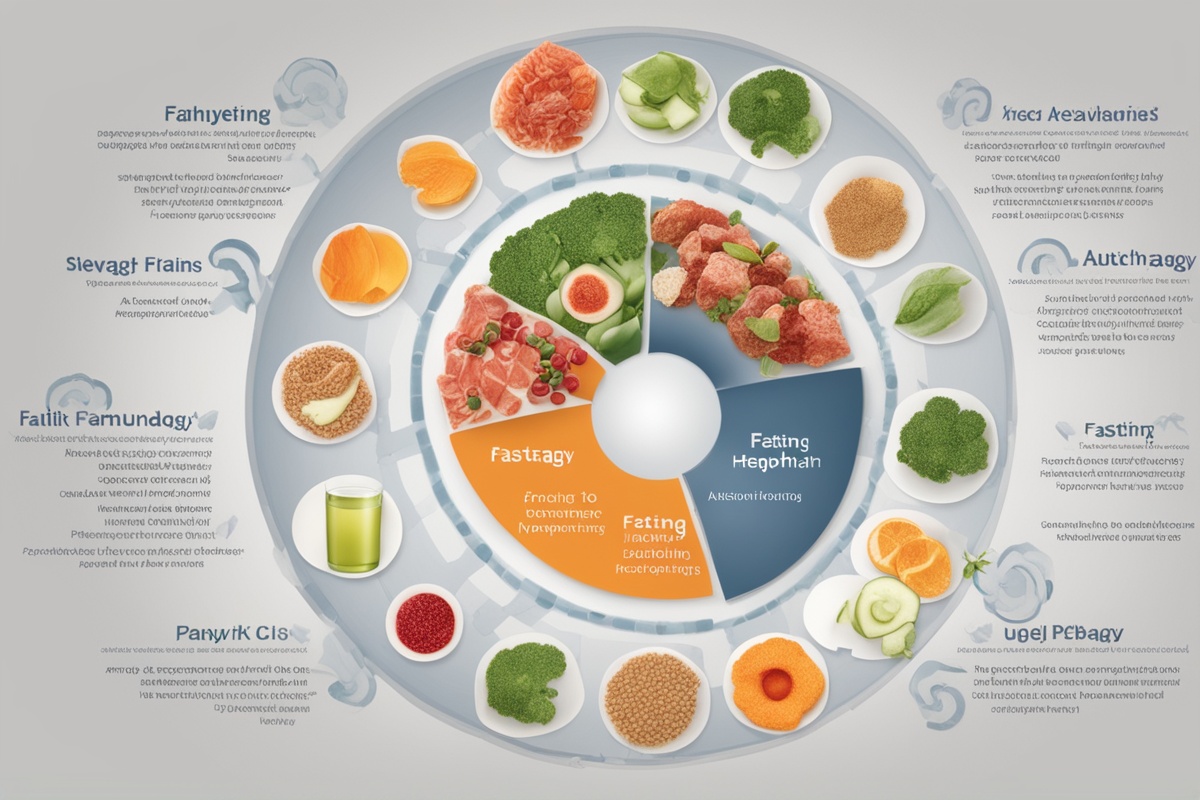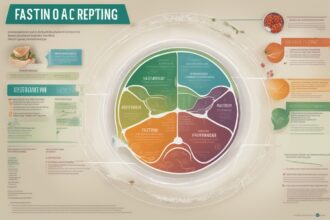Have you ever wondered how your body heals and rejuvenates itself at a cellular level? Enter autophagy, a fascinating biological process often dubbed the body’s “self-cleaning” mechanism. When combined with fasting, it becomes a powerhouse for cellular repair fasting, helping to clear out damaged cells and promote longevity. In this post, we’ll dive deep into what autophagy is, how fasting triggers this incredible process, and why it’s a game-changer for your health. Whether you’re a seasoned faster or just curious about optimizing your wellness, stick around for science-backed insights and actionable tips to harness the power of autophagy through fasting.
What Is Autophagy and Why Does It Matter?
Autophagy, derived from Greek words meaning “self-eating,” is a natural process where your cells recycle damaged or dysfunctional components. Think of it as a cellular housekeeping system that removes waste and repairs itself to maintain optimal function. Discovered by scientists like Yoshinori Ohsumi, who won the Nobel Prize in 2016 for his work on autophagy, this mechanism is crucial for preventing diseases like cancer, neurodegenerative disorders, and even aging. When you engage in cellular repair fasting, you’re essentially giving your body a break from constant digestion, allowing it to focus on this internal cleanup. It’s not just about weight loss; fasting for cellular repair can enhance your overall vitality by supporting this innate healing process.
How Fasting Triggers Cellular Repair Through Autophagy
Fasting is one of the most effective ways to activate autophagy. When you stop eating for an extended period, your body shifts from using glucose as its primary energy source to burning stored fats through a process called ketosis. This metabolic switch, often achieved through intermittent fasting or prolonged fasting, signals your cells to start breaking down unnecessary components for energy. Studies have shown that autophagy ramps up after about 12–16 hours of fasting, peaking around 24–48 hours. This is why fasting for cellular health is so powerful—it creates the perfect environment for your body to prioritize repair over digestion. By reducing nutrient intake temporarily, you’re essentially telling your cells, “Hey, let’s clean house!”
Key Benefits of Cellular Repair Fasting
The benefits of combining fasting with autophagy go far beyond just feeling lighter. Here’s a closer look at why cellular repair through fasting is a cornerstone of modern health practices:
- Improved Longevity: Autophagy helps clear out damaged proteins and organelles, which are linked to aging. Fasting may slow down cellular degeneration, potentially extending lifespan.
- Enhanced Immune Function: By removing defective cells, autophagy supports a stronger immune system, helping your body fight off infections more effectively.
- Reduced Inflammation: Fasting-induced autophagy can lower chronic inflammation, a root cause of many diseases like heart disease and diabetes.
- Brain Health: Autophagy protects neurons from damage, potentially reducing the risk of conditions like Alzheimer’s and Parkinson’s.
These benefits highlight why so many health enthusiasts are turning to fasting as a tool for cellular rejuvenation. It’s not just a trend; it’s a scientifically supported approach to wellness.
Types of Fasting to Boost Autophagy
Not all fasting methods are created equal when it comes to triggering autophagy. If your goal is cellular repair fasting, you’ll want to choose a method that aligns with your lifestyle and health needs. Here are some popular fasting protocols to consider:
- Intermittent Fasting (16/8 Method): Fast for 16 hours and eat during an 8-hour window. This is a beginner-friendly way to dip your toes into fasting for cellular health.
- 24-Hour Fast: Once or twice a week, abstain from food for a full day. This longer duration can significantly boost autophagy.
- Extended Fasting (48–72 Hours): For deeper cellular repair, extended fasts under medical supervision can maximize autophagy, though they’re not for everyone.
- 5:2 Diet: Eat normally for five days and restrict calories to 500–600 on two non-consecutive days. This method still promotes cellular cleanup without full fasting.
- Water Fasting: Consuming only water for a set period (24–72 hours) is a potent way to trigger autophagy, but it requires preparation and caution.
Remember, the key to successful fasting is listening to your body. Start slow if you’re new to fasting for cellular repair, and consult a healthcare provider if you have underlying conditions.
Practical Tips to Enhance Autophagy During Fasting
While fasting naturally promotes autophagy, there are ways to optimize the process for maximum cellular repair through fasting. It’s not just about skipping meals; it’s about creating the right conditions for your body to thrive. First, stay hydrated—drink plenty of water during your fast to support detoxification. Electrolytes like sodium, potassium, and magnesium can also prevent fatigue and cramps. Second, avoid artificial sweeteners or calorie-containing drinks, as they can break your fast and halt autophagy. Third, incorporate light movement like walking or yoga during fasting periods to stimulate cellular processes without overtaxing your body. Lastly, prioritize nutrient-dense foods when you break your fast—think leafy greens, healthy fats, and lean proteins—to provide your cells with the building blocks they need for repair.
Potential Risks and Precautions with Fasting for Cellular Repair
While cellular repair fasting offers incredible benefits, it’s not without risks if done improperly. Fasting isn’t suitable for everyone, especially pregnant women, individuals with eating disorders, or those with certain medical conditions like diabetes. Prolonged fasting without supervision can lead to nutrient deficiencies, muscle loss, or extreme fatigue. Additionally, pushing your body too hard too soon can cause stress rather than healing. Always start with shorter fasts to gauge how your body responds, and don’t hesitate to seek guidance from a doctor or nutritionist. The goal of fasting for cellular health is to support your body, not to strain it. Listen to signals like dizziness or irritability, and adjust accordingly to ensure a safe and sustainable practice.
In conclusion, autophagy and cellular repair fasting represent a powerful duo for unlocking your body’s natural healing potential. By understanding how fasting triggers this cellular cleanup process, you can make informed choices to enhance your health, from boosting immunity to slowing aging. Whether you’re experimenting with intermittent fasting or considering a longer fast for deeper repair, the key is to approach it mindfully with proper preparation and self-awareness. Remember, fasting isn’t a one-size-fits-all solution, but with the right strategy, it can be a transformative tool for cellular rejuvenation through fasting. So, why not give your cells a chance to reset? Start small, stay consistent, and watch as your body thanks you for the break it’s been craving. Have you tried fasting for cellular repair? Drop your thoughts or questions below—I’d love to hear your journey!






